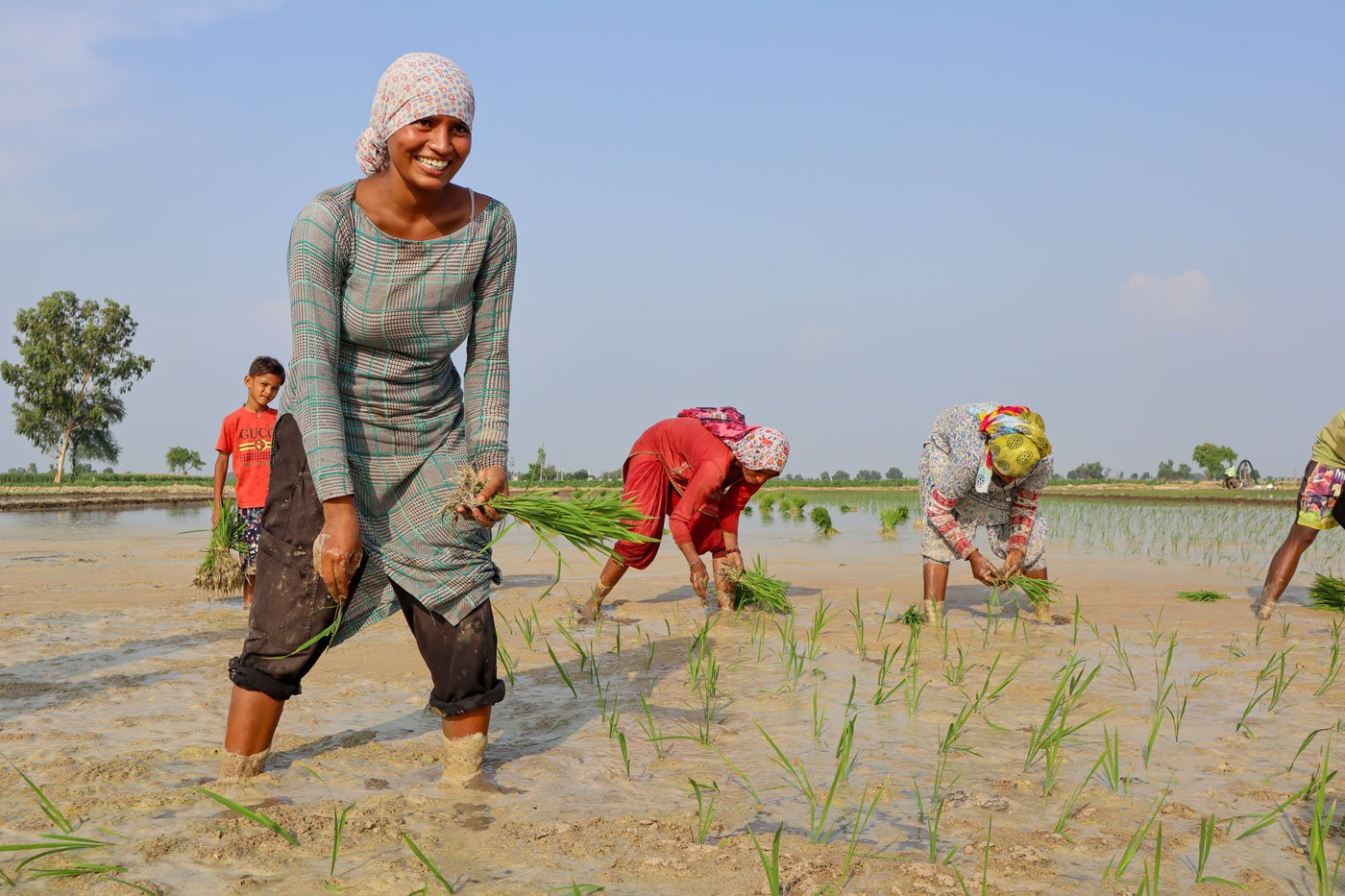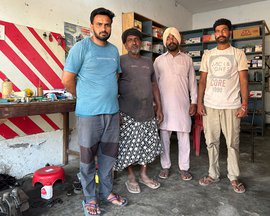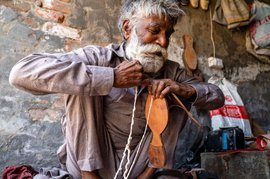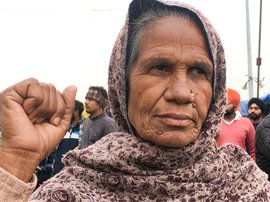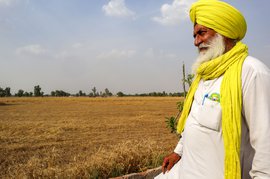When Jasdeep Kaur needed to buy a smartphone to help her study better, her parents lent her Rs. 10,000. To repay the loan, the 18-year-old spent her 2023 summer holidays transplanting paddy.
The young girl is not the only young Dalit student who works in the fields to support their families here in Sri Muktsar Sahib district of Punjab.
“We don’t labour in the fields out of joy, but out of the helplessness of our families,” says Jasdeep. Her family are Mazhabi Sikhs, listed as Scheduled Caste in Punjab; most people in her community do not own land but work in the fields of upper caste farmers.
The money her parents lent her came out of a loan of Rs. 38,000 that they had taken from a microfinance company to buy a cow. Selling the milk, which fetches up to Rs. 40 per litre, would help with household expenses. Earning opportunities in their village of Khunde Halal in Sri Muktsar Sahib district are limited – 33 per cent of the population here are agricultural labourers.
The smartphone proved invaluable when Jasdeep had to appear for a college exam in June – she attempted it online while on a two-hour break from labouring in the paddy fields. “I couldn’t afford to leave work. If I had gone to college instead, my wage would have been cut for the day,” she points out.
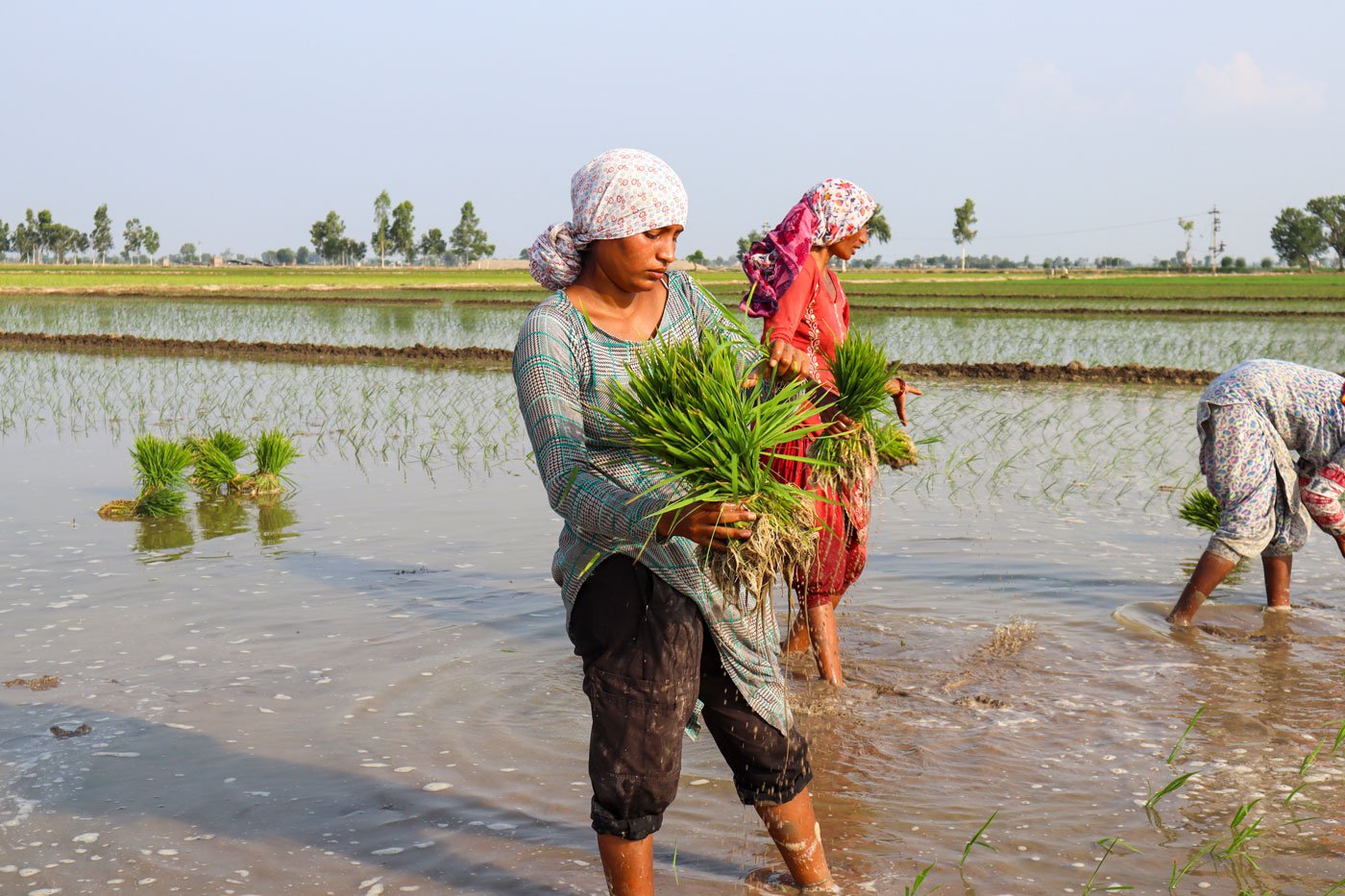
Dalit student Jasdeep Kaur, a resident of Khunde Halal in Punjab, transplanting paddy during the holidays. This summer, she had to repay a loan of Rs. 10,000 to her parents which she had taken to buy a smartphone to help with college work


'We don’t labour in the fields out of joy, but out of the helplessness of our families ,' says Jasdeep. Her family are Mazhabi Sikhs, listed as Scheduled Caste in Punjab; most people in her community do not own land but work in the fields of upper caste farmers
Agricultural labour work is not new to Jasdeep, a second-year student of commerce at the Government College Muktsar in Punjab’s Sri Muktsar district. She has been working in the fields alongside her family since she was 15 years old.
“Other children who ask to be taken to their nani pind [maternal grandmother’s village] during the summer break,” she says smiling. “While we make every effort to transplant as much paddy as possible.”
The young Jasdeep first began transplanting paddy to help her family clear two loans amounting to Rs. one lakh from a microfinance company. Both the loans were taken to pay for a motorbike that her father Jasvinder had purchased in 2019. The family paid an interest of Rs. 17,000 on one loan and Rs. 12,000 on the other.
Jasdeep’s
siblings, Mangal and Jagdeep, both 17 years old, also started working in the
fields when they turned 15. Their mother, 38-year-old Rajveer Kaur tells us
that families of farm labourers in the village start taking children to the fields
when they are seven or eight years old to watch their parents at work, “so that
the children don’t find it difficult when they actually start to labour with
us,” she explains.


Left : Rajveer Kaur (in red) says families of farm labourers in the village start taking children to the fields when they are seven or eight years old to watch their parents at work. Right : Jasdeep’s brother Mangal Singh (black turban) started working in the fields when he turned 15
The scene is repeated in their neighbours’s home – the family of Neeru, her three sisters and their widowed mother. “My mother struggles with transplanting paddy because she has kala pelia [Hepatitis C],” says 22-year-old Neeru by way of explaining why they cannot travel outside the village for work. The disease, which she contracted in 2022 has made 40-year-old Surinder Kaur susceptible to heat and prone to fever and typhoid. She receives a monthly pension of Rs. 1,500 for widows, but that is not enough for the household.
So since they were 15, Neeru and her sisters have been transplanting paddy, removing weeds and picking cotton. This is the only source of income for a family of landless Mazhabi Sikhs. “Our entire holidays were spent labouring in the fields. We would only get a week free which we used to complete our holiday homework,” says Neeru.
But working conditions, especially in the long, hot summers are hard: as the water in the paddy fields begins to heat up, women and girls have to find some shade for the afternoon, resuming only after 4 p.m. It’s physically arduous work, but with bills to pay, there is no option for the families of Jasdeep and Neeru.
“How will we manage the household, if all our earnings are spent on their expenses,” asks Rajveer, referring to the costs of school fees, new books and uniforms every year.
“The two of them have to go to school!” she says, sitting on a manjji (string bed) in the courtyard of their pucca house. Jagdeep studies in Government Girls Senior Secondary Smart School in Lakhewali, 13 kilometres from their village.


Jasdeep (left) and Rajveer (right) drinking water to cool down. Working conditions in the hot summer months are hard and the labourers have to take breaks
“We have to pay 1,200 rupees every month for a transport van service for the girl. Then, we have to spend some money for their assignments,” Jasdeep says and adds resignedly, “there is always some expense or the other.”
In July, after the summer vacation, Mangal and Jagdeep are to appear for their school examinations. The family has decided to give them a couple of days off towards the end of the holidays so that they can focus on their studies.
Jasdeep
is confident in her younger siblings’ ability to perform well. However, things
may not be the same for many of the other youth in the village. “They struggle
and it makes them worry,” she says, sitting near her mother on the
manjji
.
The young girl is doing her bit
– she is part of a group of college-going Dalits in the village who provide
free tuition classes to the children in the community in the evenings. These
classes are not regularly held in June as most are out in the fields, away from
4 a.m. to after 7 p.m.
*****
Transplanting paddy is one of the few seasonal occupations available to the landless families of farm labourers. Each family is paid around Rs. 3,500 for transplanting paddy on an acre of land, with an additional Rs. 300 if the nurseries are located at a distance of around two kilometres from the fields. If two or more families are employed together for the task, they earn a daily wage ranging from Rs. 400 to Rs. 500 per person.
However,
many families in Khunde Halal now report a decrease in the availability of work
during the
kharif
season. For
instance, Jasdeep and her parents planted paddy on 25 acres of land this
season, five acres less than last year. The three of them earned Rs 15,000
each. The younger siblings earned about Rs 10,000 each for the season.


Transplanting paddy (right) is one of the few seasonal occupations available to labourers in this village. As they step barefoot into the field to transplant paddy, they leave their slippers at the boundary

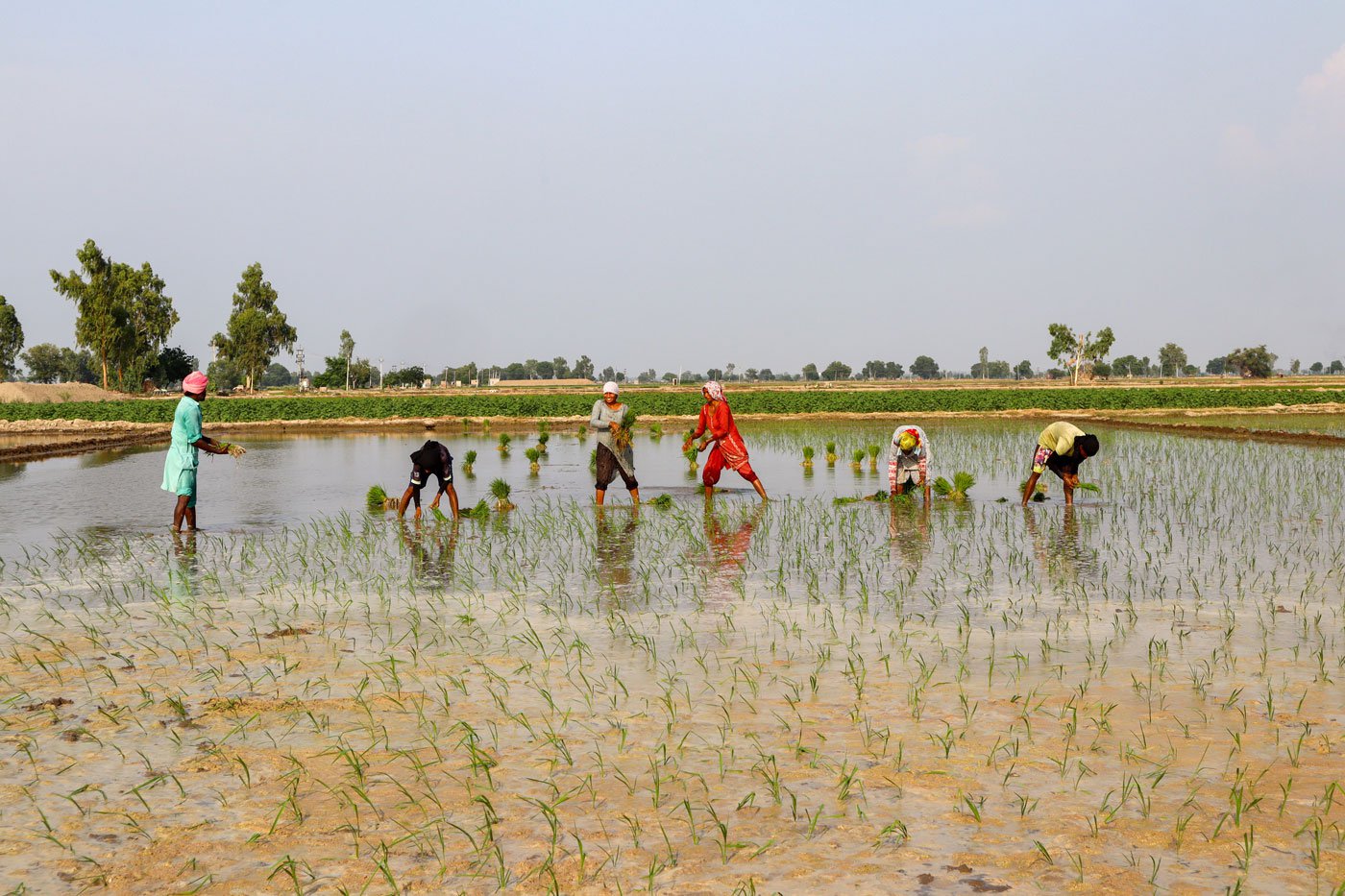
Left: Jasdeep’s father Jasvinder Singh loading paddy from the nurseries for transplanting. Right: Each family of farm labourers is paid around Rs. 3,500 for transplanting paddy on an acre of land. They earn an additional Rs. 300 if the nursery is located at a distance of about two kilometres from the field
The other option for work is picking cotton in winter. That is no longer as viable as it used to be, as Jasdeep says, “the cultivation of cotton has diminished in the last 10 years due to pest attacks and receding levels of groundwater.”
The lack of work opportunities means some of the farm labourers take up other work as well. Jasdeep’s father Jasvinder used to work as a mason, but a pain in the lower part of his body has made him give it up. In July 2023, the 40-year-old secured a loan from a private bank to buy a car – a Mahindra Bolero – and now ferries passengers in the car in the village; he still does farm labour work. The family must pay off the loan for the vehicle over a period of five years.
Until two years ago Neeru’s family would transplant paddy on at least 15 acres of land during the summer holidays. This year, they worked only on two acres of land in exchange for fodder to feed their livestock.
In 2022, Neeru’s elder sister, 25-year-old Shikhash started working as a medical laboratory assistant in Doda, 26 kms away. Her monthly salary of Rs. 24,000 brought some relief to the family who bought a cow and a buffalo; the girls even acquired a second-hand motorbike for short-distance commuting. Neeru is also training to become a lab assistant like her sister and her fees are borne by a welfare society in the village.
Their
youngest sister, 14-year-old Kamal joined the family in the fields. A student
of Class 11 at the same school as Jagdeep, she is juggling between labour work
and her school work.


Left: Sukhvinder Kaur and her daughters Neeru and Kamal (left to right) have transplanted paddy on two acres of land in the village this season in payment for the fodder they had taken from a farmer. Right: After Neeru’s elder sister Shikhash began working as a medical lab assistant in 2022, the family bought a cow and a buffalo to support their household expenses by selling milk
*****
“Farm labourers in the village now only have 15 days of work available during this season as farmers have increasingly adopted DSR,” says Tarsem Singh, who serves as the general secretary of the Punjab Khet Mazdoor Union. Jasdeep agrees, saying they could each once earn up to Rs 25,000 just by transplanting paddy.
But now, “many farmers choose to do sidhi bijai [direct seeding of rice or DSR] using machines. These machines have taken away our mazdoori [labour],” laments Jasdeep’s mother, Rajveer.
Neeru adds, “this is why many villagers travel to distant villages to find work.” Some labourers believe that the use of machines has increased since the state government has announced a financial aid of Rs. 1,500 per acre for adopting the DSR technique.
Gurpinder
Singh, a farmer with 43 acres of land in Khunde Halal has been using the DSR
method for the past two seasons. He points out, “There is no difference in
getting paddy planted through a labour or a machine. It is only water that a
farmer saves through direct seeding of rice, not money.”


Gurpinder Singh (left) owns 43 acres of land (right) in Khunde Halal and has been using the DSR method for two years. But he still has to hire farm labourers for tasks such as weeding

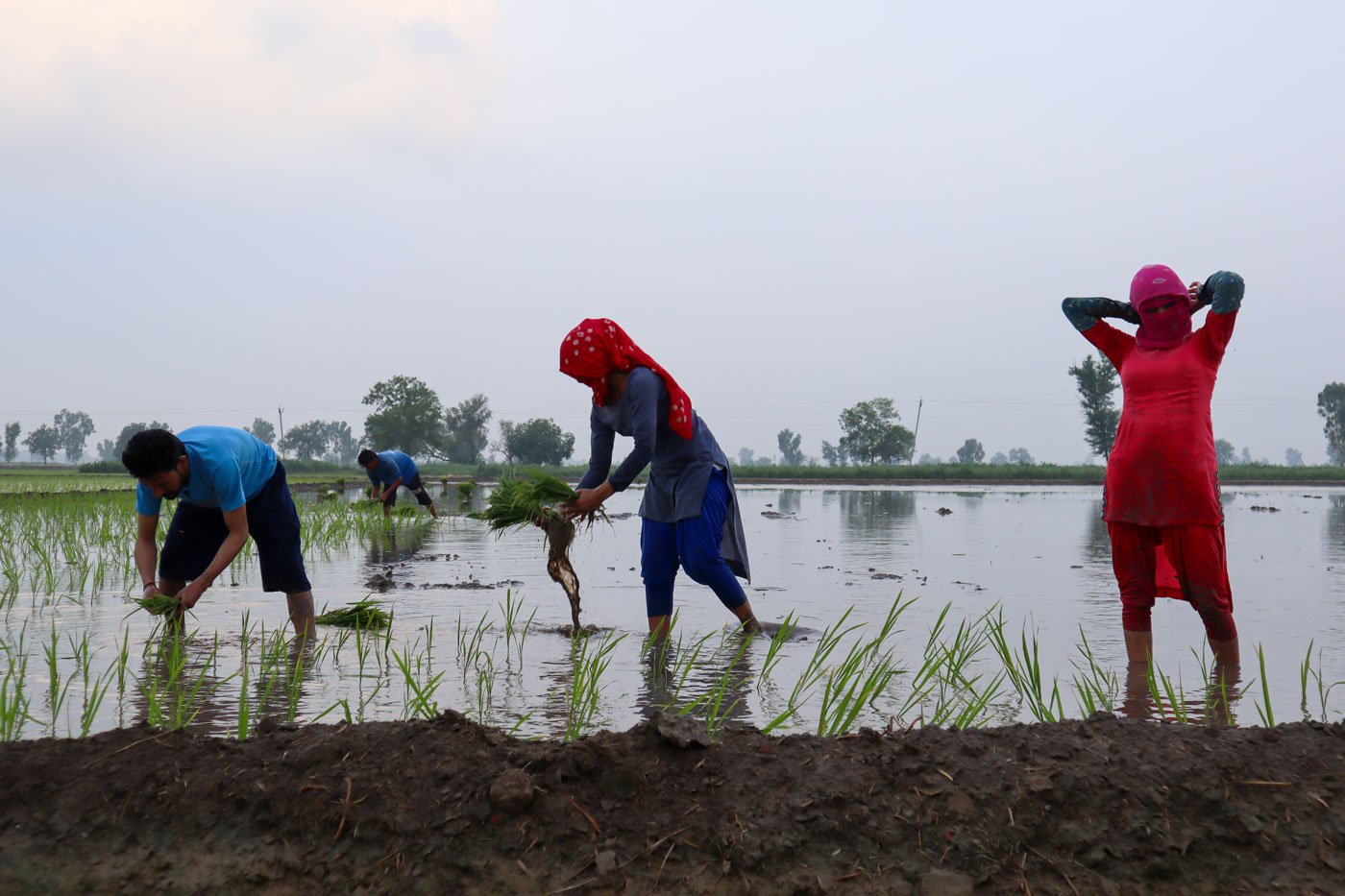
Left:
Mangal, Jasdeep and Rajveer
transplanting
paddy in the fields of upper caste farmers
And the 53-year-old notes that they are able to plant double the amount of seeds using DSR.
But, he admits that this method leaves the fields dry, making it easy for rats to get in and destroy the crop. “More herbicides get sprayed when we use DSR because of high weed infestation. There is less weed infestation when paddy is transplanted by labourers,” he says.
So, farmers like Gurpinder end up hiring labourers again to get rid of the weed.
“Why
don't farmers employ farm labourers to do the job if there’s no profit in
adopting the new technique?” asks Tarsem, a Mazhabi Sikh. The farmers, he says, are fine with filling the pockets of
pesticide companies, but, “
mazdoora de tan kalle hath hi ne, auvi ei khali
karaan’ch lage ne
[depriving the labourers of work],” he adds.
